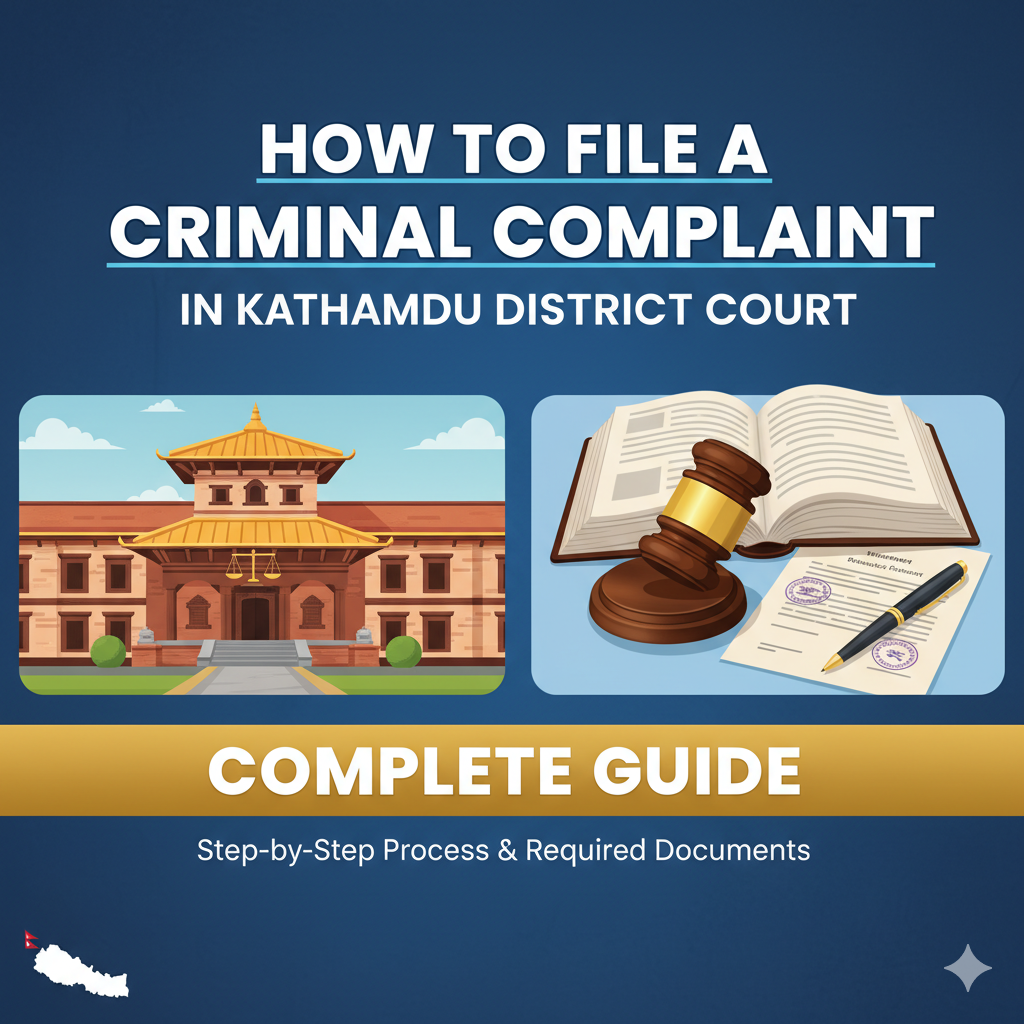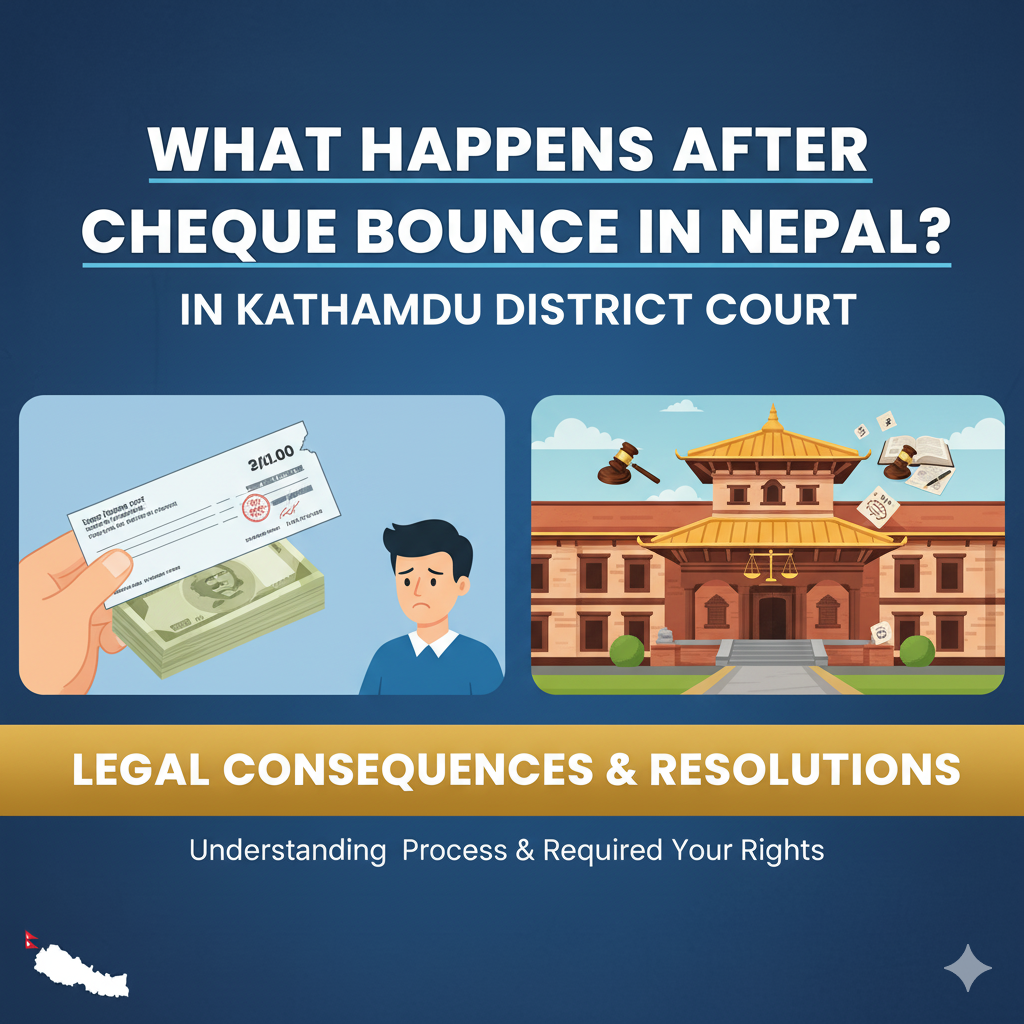
Introduction
How to File a Criminal Complaint in Kathmandu District Court. Are you a victim of a crime in Kathmandu or know someone who needs legal recourse? Understanding how to file criminal complaint Kathmandu District Court procedures is crucial for seeking justice in Nepal’s legal system. According to recent statistics from Nepal’s judiciary, over 15,000 criminal cases are filed annually in Kathmandu District Court alone, yet many citizens remain unaware of the proper procedures for initiating legal action. This comprehensive guide will walk you through the entire process of filing a criminal complaint, from understanding jurisdiction to what happens after your case is registered. Whether you’re dealing with theft, fraud, assault, or other criminal matters, this resource will provide the actionable information you need to navigate the Kathmandu court procedure with confidence.
Table of Contents
- Understanding Criminal Complaints in Nepal
- When to File at Kathmandu District Court
- Police vs. Direct Court Filing
- Required Documents Checklist
- Step-by-Step Filing Process
- Timeline Expectations
- Costs and Fee Structure
- What Happens After Filing
- Common Mistakes to Avoid
- Legal Representation Requirements
- Appeal Processes
- Kathmandu District Court Contact Information
- Frequently Asked Questions
Understanding Criminal Complaints in Nepal
A criminal complaint in Nepal is a formal legal document that initiates criminal proceedings against an individual or entity accused of committing a criminal offense. The criminal complaint Nepal legal framework primarily operates under the Criminal Procedure Code of 2017, which establishes the procedures for initiating criminal proceedings.
There are two main types of criminal complaints in Nepal:
- Police Complaint (FIR): Filed at a police station when the offense is cognizable (serious crimes where police can arrest without warrant)
- Private Complaint: Directly filed in court when the offense is non-cognizable or when police refuse to register an FIR
Understanding which type of complaint applies to your situation is the first step in the criminal case filing Nepal process.
When to File at Kathmandu District Court
The Kathmandu District Court has jurisdiction over criminal offenses committed within the Kathmandu metropolitan area. You should file your criminal complaint here when:
- The crime occurred within Kathmandu district boundaries
- The accused resides within Kathmandu district
- Part of the criminal act took place within Kathmandu district
- You’re appealing a decision from a lower court within Kathmandu
For offenses committed outside Kathmandu, you would need to file at the appropriate district court with jurisdiction over that area.
Police vs. Direct Court Filing
Understanding when to approach the police versus filing directly in court is crucial for the criminal complaint process.
Filing with Police (FIR Process)
For cognizable offenses (serious crimes like murder, rape, theft, kidnapping), you should first approach the police:
- Visit the police station with jurisdiction over the area where the crime occurred
- Provide a detailed account of the incident
- The police will record your statement and prepare an FIR (First Information Report)
- Obtain a copy of the FIR for your records
- The police will then investigate the case and submit a report to the court
If the police refuse to register your FIR, you can approach a senior police officer or file a complaint directly with the court.
Direct Court Filing
You may need to file directly with Kathmandu District Court in these situations:
- The offense is non-cognizable (less serious crimes where police cannot arrest without warrant)
- The police have refused to register your FIR
- You have evidence that the police are not conducting a proper investigation
- The court has specifically directed you to file directly
Required Documents Checklist
Before you file criminal complaint Kathmandu District Court, ensure you have the following documents:
Essential Documents:
- Written complaint detailing the incident (signed by the complainant)
- Identity proof of the complainant (citizenship certificate, passport, etc.)
- Address proof of the complainant
- Identity details of the accused (if known)
- Evidence supporting your complaint (photos, videos, documents, etc.)
- Witness statements (if applicable)
- Medical reports (in cases of physical harm)
Additional Documents (if applicable):
- Previous complaints filed with police
- Correspondence with the accused
- Expert reports (if relevant to the case)
- Financial records (in cases of financial crimes)
[Visual Element: Document Checklist Infographic]
Consider adding a visual checklist here that readers can download or screenshot for reference
Step-by-Step Filing Process
Follow these detailed steps to file a criminal complaint in Kathmandu District Court:
Step 1: Draft Your Complaint
Prepare a written complaint that includes:
- Your full name, address, and contact information
- The full name and address of the accused (if known)
- A chronological account of the incident
- Specific sections of law that have been violated (if known)
- The relief you are seeking from the court
- List of evidence you are submitting
Step 2: Prepare Supporting Documents
Organize all supporting documents mentioned in the checklist above. Make photocopies of all documents as the court will retain them.
Step 3: Visit Kathmandu District Court
Go to Kathmandu District Court located at Babarmahal. The criminal section operates from Sunday to Thursday, 10 AM to 4 PM, with a lunch break from 1 PM to 2 PM.
Step 4: Obtain and Fill the Application Form
Visit the criminal section counter and request a criminal complaint form. Fill it out completely, providing all required information.
Step 5: Submit Your Complaint
Submit your complaint form along with all supporting documents to the court clerk. The clerk will verify your documents and assign a case number.
Step 6: Pay the Required Fees
Pay the court fees at the designated counter. The amount varies based on the nature of the complaint.
Step 7: Receive Acknowledgment
Obtain an acknowledgment receipt with your case number and date of filing. This receipt is crucial for tracking your case.
Step 8: Follow Up
Regularly check the status of your case at the court or through their online portal (if available).
[Visual Element: Process Flowchart]
Consider adding a flowchart here visually representing the entire filing process
Timeline Expectations
The criminal case filing Nepal process typically follows these timelines:
- Initial filing: 1-2 days
- Initial court hearing: Usually within 15-30 days of filing
- Evidence collection: 1-3 months (varies by case complexity)
- Witness examination: 2-6 months
- Judgment: 6 months to 2 years, depending on case complexity and court backlog
The Criminal Procedure Code of Nepal stipulates that criminal trials should be completed within one year, but delays are common due to case backlogs and various procedural factors.
Costs and Fee Structure
Filing a criminal complaint in Kathmandu District Court involves several costs:
- Court filing fee: NPR 500-2,000 depending on the nature of the offense
- Legal documentation: NPR 200-500 for affidavits and other legal documents
- Lawyer fees: NPR 10,000-50,000 for initial filing (varies by lawyer and case complexity)
- Additional expenses: Transportation, photocopies, and miscellaneous expenses
If you cannot afford these costs, you may apply for legal aid through the Legal Aid Nepal program, which provides free legal services to eligible citizens.
What Happens After Filing
Once your criminal complaint is filed, the following process typically unfolds:
- Initial Hearing: The court will schedule an initial hearing to review your complaint
- Summons Issuance: If the court finds merit in your complaint, it will issue summons to the accused
- Plea: The accused will enter a plea (guilty or not guilty)
- Evidence Collection: Both parties will present evidence and witnesses
- Cross-examination: Both sides can cross-examine witnesses
- Arguments: Both parties will present their arguments
- Judgment: The court will deliver its verdict based on evidence and arguments
Common Mistakes to Avoid
When filing a criminal complaint in Kathmandu District Court, avoid these common mistakes:
- Incomplete Documentation: Failing to include all necessary documents can lead to delays or rejection
- Incorrect Jurisdiction: Filing in the wrong court wastes time and resources
- Vague Complaints: Unclear or general complaints without specific details may be dismissed
- Missing Deadlines: Not following court-mandated timelines can harm your case
- Improper Evidence Submission: Not following proper procedures for submitting evidence
- Not Keeping Copies: Failing to keep copies of all submitted documents
- Ignoring Legal Advice: Attempting to navigate complex legal procedures without proper guidance
Legal Representation Requirements
While you can file a criminal complaint without a lawyer, legal representation is highly recommended, especially for complex cases. A qualified lawyer can:
- Ensure your complaint is properly drafted
- Help gather and present evidence effectively
- Navigate court procedures efficiently
- Represent you during hearings
- Advise on legal strategies and options
If you cannot afford a lawyer, you may apply for legal aid through the Nepal Bar Association or Legal Aid Nepal.
Appeal Processes
If you’re dissatisfied with the court’s decision, you have the right to appeal:
- Appellate Court Appeal: Appeals against Kathmandu District Court decisions are filed with the High Court, Patan
- Timeline: Appeals must typically be filed within 35 days of the judgment
- Grounds for Appeal: Appeals can be filed on grounds of legal errors, procedural irregularities, or misinterpretation of facts
- Process: The appellate court will review the lower court’s proceedings and may affirm, modify, or reverse the decision
Kathmandu District Court Contact Information
Address: Babarmahal, Kathmandu, Nepal
Phone: +977-1-4220140
Office Hours:
- Sunday-Thursday: 10 AM – 4 PM (with lunch break from 1 PM – 2 PM)
- Friday: 10 AM – 1 PM
- Saturday: Closed
Frequently Asked Questions
Q1: Can I file a criminal complaint online in Kathmandu District Court?
Currently, Kathmandu District Court does not offer complete online filing for criminal complaints. However, some forms can be downloaded from their website, and case status can be checked online. Physical submission of documents is still required.
Q2: What is the difference between an FIR and a private complaint?
An FIR (First Information Report) is filed with the police for cognizable offenses, while a private complaint is filed directly in court for non-cognizable offenses or when police refuse to register an FIR.
Q3: How long does it take for a criminal complaint to be registered in Kathmandu District Court?
Typically, a criminal complaint is registered within 1-2 days of submission, provided all documents are in order. The first hearing is usually scheduled within 15-30 days.
Q4: Can I file a criminal complaint without a lawyer?
Yes, you can file a criminal complaint without a lawyer. However, for complex cases or if you’re unfamiliar with legal procedures, hiring a lawyer is advisable.
Q5: What happens if the accused doesn’t appear in court after summons?
If the accused fails to appear despite proper summons, the court may issue a warrant for their arrest and may proceed with the trial in their absence.
Q6: Is there a time limit for filing a criminal complaint in Nepal?
Yes, there are limitation periods for filing criminal complaints in Nepal, varying based on the severity of the offense. For serious crimes like murder, there is no limitation period, while for lesser offenses, it typically ranges from 3 months to 3 years.
Q7: Can I withdraw my criminal complaint after filing?
Yes, a complainant can withdraw their criminal complaint with the court’s permission. However, the court may refuse withdrawal if it believes proceeding with the case is in the public interest.
Conclusion
Filing a criminal complaint in Kathmandu District Court may seem daunting, but with proper preparation and understanding of the process, it becomes manageable. Remember to gather all necessary documentation, be precise in your complaint, and consider seeking legal representation to navigate the complexities of Nepal’s criminal justice system.
If you’re ready to file criminal complaint Kathmandu District Court, use this guide as your roadmap to justice. For personalized legal assistance, consider consulting with a qualified lawyer who specializes in criminal law in Nepal.
Call to Action: Have you filed a criminal complaint in Kathmandu District Court? Share your experience in the comments below to help others in similar situations. For specific legal advice tailored to your case, contact our legal team at [contact information] for a consultation.



